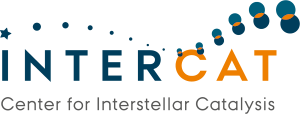As Alfred mentioned in his final post, his and Julia’s activity on this blog is over. However, that does not mean the end of this blog. Instead, we will be taking over the blog, but with a different approach. In this article, we will explain what this approach will entail. But first, who are we exactly?
Who are we?
We are Luuk, Niels, and Ann, three relatively new PhD students in InterCat, and we will form the Research Roundtable. Below, each of us will shortly introduce ourselves.
Luuk
I am 25 years old and I am a PhD student focusing on theoretical modeling of metal–oxide interfaces in inverted catalysts (metal oxides on a metal support) using a combination of density functional theory, machine learning, and global optimization techniques. I am originally from the Netherlands, where I did my bachelor’s and master’s degrees in chemical engineering at Eindhoven University of Technology. In my free time, I enjoy listening to music, playing video games, and watching good television shows.
Niels
I am a 26-year-old PhD student at InterCat, focused on theoretical studies of interstellar ices. I also did my bachelor’s and master’s degree at Aarhus University. Outside of work, I enjoy drumming, playing basketball, and spending time with my cat.
Ann
I am a PhD student at InterCat, exploring molecules relevant to interstellar medium using experimental techniques. I did my master’s degree at Bangalore University, India and thereafter joined AU. Besides my time in the lab, I dance, hunt for cakes and cook for fun.
What will we be writing about?
All three of us are curious, and we plan on sharing this curiosity. As we have different backgrounds and are studying different things, we all have different pockets of knowledge. We will ask each other questions about whatever we want to know more about—whether that’s about our research, or any other topic of personal interest. The question will then be answered, and a new question will be proposed. This will form a continuous loop of asking and answering questions, satisfying our curiosity as we go. We call this loop the Research Roundtable.
With this introduction out of the way, it is time to pose the first of our questions: how do we use computers to do theoretical chemistry calculations?
